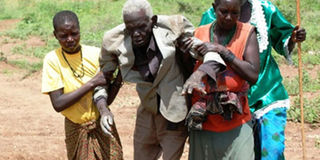Prime
Transform regional referral hospitals in the new cities

The move would draw health services closer to people. PHOTO/FILE
What you need to know:
- The gaps below can be breached through health infrastructural and services reforms, including elevating and equipping health facilities with appropriate and relevant health mechanics.
Even though northern Uganda is indisputably peaceful, a significant number of victims and survivors of the Lord’s Resistance Army (LRA) rebellion are still far from healing. Many are nursing different forms of conflict-induced medical harms that require critical rehabilitation services beyond generic services.
The elevation of the former districts of Gulu, Arua and Lira into cities should offer a brand of golden opportunity for rehabilitation of war victims grappling with unaddressed wartime injuries and related medical ailments that require specialized services that are currently being accessed in Kampala Capital City ( Mulago and Butabika) hundreds of kilometers away from the sufferers. Accessing the national referral hospitals in Kampala has for a long of time been a serious challenge for many severely sick Ugandan nationals upcountry, with particular unique challenges for victims of armed conflicts with unique vulnerabilities and critical medical rehabilitation needs.
When the Uganda’s Cabinet on May 20, 2019 approved the creation of 15 cities across the country in phases, I was excited that the government had answered a prayer from war victims for creation of “new Mulagos” in Northern Uganda where they can easily utilize affordable ways of reaching/accessing the facilities such as by; walking, boda-boda, etc from their homes to access appropriate treatment services. The cost of accessing national referral hospital has been extremely high for many people across Uganda in terms of transportation, feeding and medical bills.
Additionally, even though some NGOs and politicians have supported and purchased ambulances in their constituencies (thanks to those politicians), ambulance services are very expensive and in most cases not available. The quest for national health insurance needs urgent intervention from the state and policy makers in Uganda to leverage the have-nots.
In my view, elevating Gulu, Arua and Lira into cities should be followed by elevation and transformation of the current regional referral hospitals therein into fully fledged national referral hospitals.
Recognizably, mass media has played some pivotal role in advocating for financial support towards transportation, feeding and treatment of some vulnerable critically ill patients for specialized health services in Kampala and abroad. Decentralizing multiple specialized health services from the capital to newly created cities will reduce burdens on well-wishers and Samaritan purse. A positive transformation of the facilities in those principalities will highly promote better national health outcomes and leverage the suffering citizens from the burden of accessing services from facilities that cannot address their specific health concerns.
Stakeholders should remember that citizen’s health is indispensably critical for productive participation of citizens in national development and peace building. Further, good health boost individual, household and national level of income that can help in reducing income inequality and increased governmental tax base for productive citizens who are healthy.
The above gaps can be breached through health infrastructural and services reforms, including elevating and equipping health facilities with appropriate and relevant health mechanics. National leaders (Parliament and Executive) should prioritize health financing with appropriate budget so as to spring Ugandans strive towards achieving better health index. Let’s minimize the risks losing citizens to treatable/manageable health conditions and getting preventable health related disabilities.
Benard Kasozi Okot, Senior Psychosocial Research and Advocacy Officer at Refugee Law Project (RLP), Gulu




